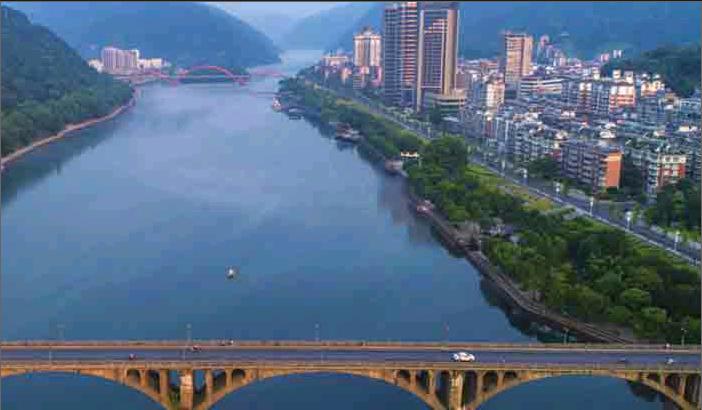Paid to Protect
2018-01-09ByWangHairong
By+Wang+Hairong

Wang Wenjin, a middle-aged ex-fish farm owner in Shexian County of Anhui Province, deserves credit for the high water quality in Qiandao Lake, or Thousand-Island Lake, which is located scores of kilometers away in neighboring Zhejiang Province.
Wang resides near the Xinan River, which feeds into Qiandao Lake. The lake was ranked fi fth among 53 important reservoirs in China in terms of water quality in 2017 by the Ministry of Environmental Protection. It enchants tourists from far and wide with its picturesque scenery.
Wangs family traditionally subsisted on fi shing. He once operated a fi sh farm. At its prime, the farm bred hundreds of tons of fi sh annually. But in 2013, he had to shut it down as the local government decided to halt aquaculture that polluted the water body.
In return for his sacrifice, he was paid one-off compensation of approximately 580,000 yuan ($88,213), he told the Peoples Daily. Thereafter, he became a tourist boat driver in a town further upstream, on a monthly salary of about one tenth of his previous monthly income.
The Xinan River Basin was the fi rst river basin chosen to pilot inter-province ecological compensation. Anhui and Zhejiang, the two provinces along the river, began to carry out the trial in 2012 under the coordination of the Ministry of Finance and the Ministry of Environmental Protection.
Following pilots conducted since 2015 in seven other locales—the provinces of Shandong, Jiangsu, Hunan, Guizhou and Yunan, as well as Chongqing Municipality—ecological compensation schemes began to be tried nationwide starting from January 1, 2018.
Inter-province compensation
Qiandao Lake was once heavily polluted. It suffered its fi rst blue-green algae outbreak in 1998. Official environment statistics show that its water quality further deteriorated from 2001 to 2007. The Xinan River contributes more than half of the lakes water volume, and in years past, also fed a signifi cant amount of pollutants into the lake.
To keep Chinas mountains green and rivers clear, governments at various levels have launched campaigns against pollution in the past five years. In Huangshan City, which has jurisdiction over Shexian County, over 170 polluting enterprises and many fish farms have been shut down, and 90-plus others have been relocated to a circular economy park. A large area of farmland has been converted back to forest, and the city has given the red card to projects featuring heavy pollution and high energy consumption.endprint
Because of the policy of ecological compensation, farmers who have made sacrifi ces for environment protection such as Wang have received fi nancial handouts. Moreover, upstream Anhui Province can also get compensation from downstream Zhejiang Province for keeping the Xinan River clean.
The quality of water in the river where it crosses the border between Anhui and Zhejiang provinces is monitored several times a day. Every month, environmental officials from both provinces retrieve water samples, which are then tested for key water quality indicators such as phosphorus, ammonia and nitrogen content. The results determine which province should be compensated.
During the period from 2012 to 2015, according to the ecological compensation agreement between the two provinces, if the rivers water quality at the border met the specified standards, downstream Zhejiang had to pay upstream Anhui 100 million yuan($15.2 million) per year for keeping the river clean. If the water quality failed to meet the required standards, payment of the same amount had to be made in reverse. In either case, the Central Government paid Anhui Province 300 million yuan ($45.6 million) for carrying out pollution control. The compensation could only be used for ecological protection.
Monitoring data show that from 2012 to 2015, the water quality in the Xinan River became good and that of Qiandao Lake gradually improved.
In 2016, the two provinces reached a new compensation agreement. Stricter water quality standards were set and the compensation to be paid by either province was doubled. The aggregate amount to be paid by the Central Government remained the same for the period.
Policy evolution
Ecological compensation is an important economic measure for environmental protection, to which the government has attached great importance, said Ou Xiaoli, an inspector with the National Development and Reform Commission, at an international forum on ecological protection held in Chongqing on December 8-9, 2017.
In 2005, the central leadership of China made a decision to accelerate the establishment of an ecological compensation system. This was reiterated at the 18th National Congress of the Communist Party of China(CPC) held in 2012. The 19th CPC National Congress, which concluded in October 2017, stated that “we will improve systems for regeneration of croplands, grasslands, forests, rivers, and lakes, and set up diversifi ed market-based mechanisms for ecological compensation.”endprint

Article 31 of the amended Environmental Protection Law, implemented since 2015, stipulates that the state should increase fiscal transfers to areas under ecological protection, while local governments should ensure the funds are used for ecological protection. The state should guide the governments of benefi ciary areas and those of ecologically protected areas to implement ecological compensation schemes through consultation or according to market rules.
In recent years, governments at various levels have promulgated rules to set up and improve the ecological compensation system. In 2016, the State Council issued opinions on improving the system. Since then, 20 provincial administrative units, including that of Anhui, have produced plans to put the State Councils opinions into effect, Ou said. Relevant government departments such as the Ministry of Finance, the State Forestry Administration, the Ministry of Water Resources and the Ministry of Agriculture have also drawn up methods for administering ecological compensation.
In China, vertical compensation, namely, compensation from a higher level government to a lower level one, is the major form of ecological compensation, said Ou. Since 2008, fiscal transfers have been made to key ecological function zones, he said. The Central Government has paid compensation for forest protection since 2001, for grassland protection since 2011, and for wetland protection from 2014. Compensation mechanisms have also been put together to protect desert, streams, seas and farmland, he added.
In addition, horizontal compensation, namely, compensation between governments at the same level, has also been carried out, starting with the Xinan River Basin scheme and expanding to other similar areas such as the Jiuzhou, TingjiangHanjiang, Dongjiang and Luanhe river basins, Ou said.
He said that China has pushed forward market-based ecological compensation through trading of water rights, carbon emission rights and pollution discharge rights. In 2017, the rights to 240 million cubic meters of water were traded in water rights exchanges in China, with a total transaction value of 178 million yuan ($27 million), Ou said. Since 2013, the rights to 115 million cubic meters of water have been transferred between Ordos and Bayannur cities in Inner Mongolia Autonomous Region, he added. He also mentioned carbon emission trading in Chongqing and pollution discharge rights trading in Shanxi and Guizhou provinces.
Ou also pointed out some problems in the ecological compensation system, including weak market-based compensation mechanisms, small transaction volumes, diffi culty in differentiating between the stock and fl ow value of ecological resources as well as between the effects of natural and human factors on environment, and a lag in ecological compensation legislation.
Ou said in the next step, an ecological compensation regulation will be drafted which will spell out the principles and standards of compensation, who should be compensated, and the rights and obligations of parties concerned. It will provide a legal basis for ecological compensation, he said.
He said that the government will continue to promote market-based ecological compensation and engage the private sector. The forms of compensation will be further diversifi ed to include not only money, but also compensation in kind such as services, facilities or other forms of support.endprint
